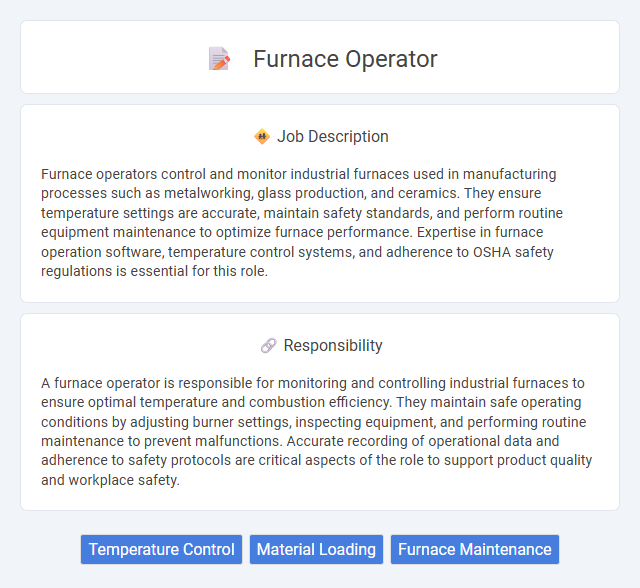
Furnace operators control and monitor industrial furnaces used in manufacturing processes such as metalworking, glass production, and ceramics. They ensure temperature settings are accurate, maintain safety standards, and perform routine equipment maintenance to optimize furnace performance. Expertise in furnace operation software, temperature control systems, and adherence to OSHA safety regulations is essential for this role.
Furnace operator roles likely suit individuals who demonstrate strong attention to detail, physical stamina, and the ability to work in hot, noisy environments. Those with a tolerance for repetitive tasks and strict safety protocols may find this job compatible with their skills and temperament. However, people with respiratory issues or sensitivity to high temperatures might find the working conditions challenging and potentially unsuitable.
Qualification
A furnace operator must possess technical knowledge of furnace operations and maintenance, typically obtained through a high school diploma or equivalent combined with specialized vocational training or apprenticeships. Proficiency in monitoring temperature controls, safety protocols, and equipment performance is essential for optimal furnace function and prevention of hazards. Relevant certifications in industrial safety and equipment handling often enhance employability and demonstrate expertise in furnace operation.
Responsibility
A furnace operator is responsible for monitoring and controlling industrial furnaces to ensure optimal temperature and combustion efficiency. They maintain safe operating conditions by adjusting burner settings, inspecting equipment, and performing routine maintenance to prevent malfunctions. Accurate recording of operational data and adherence to safety protocols are critical aspects of the role to support product quality and workplace safety.
Benefit
Furnace operators likely benefit from stable employment due to the ongoing demand for skilled workers in manufacturing and metal industries. They may receive competitive wages and opportunities for overtime pay, contributing to overall financial stability. Access to health and safety training programs could improve workplace security and enhance long-term career prospects.
Challenge
A furnace operator likely faces complex challenges related to maintaining optimal temperature control and ensuring safety in high-risk environments. The role probably demands quick problem-solving skills to address unexpected equipment malfunctions and prevent production delays. Managing the balance between operational efficiency and regulatory compliance may present ongoing difficulties throughout daily tasks.
Career Advancement
Furnace operators gain valuable expertise in managing high-temperature industrial processes, which opens pathways to advanced roles such as plant supervisor or maintenance manager. Mastery of safety protocols and furnace technology enhances prospects for specialized certifications, boosting employability and salary potential. Continuous skill development in automation and process optimization supports career growth within manufacturing and metallurgical industries.
Key Terms
Temperature Control
Furnace operators are responsible for precise temperature control to ensure optimal metal melting and processing conditions, often maintaining temperatures ranging from 1,200degF to 3,000degF depending on the material. They monitor temperature gauges and adjust fuel or electrical inputs to maintain consistent heat levels, crucial for product quality and safety. Effective temperature control minimizes energy consumption and prevents equipment damage in industrial furnace operations.
Material Loading
Furnace operators expertly manage the precise loading of raw materials such as metals, alloys, and refractory substances into industrial furnaces to ensure optimal melting and heat treatment processes. Accurate material loading is critical for maintaining furnace temperature balance, enhancing operational efficiency, and preventing contamination or damage to furnace lining. Proficiency in interpreting batch codes, weight specifications, and material safety data sheets (MSDS) is essential for success in this role.
Furnace Maintenance
Furnace operators ensure the efficient operation of industrial furnaces by performing regular maintenance tasks such as inspecting burners, cleaning heat exchangers, and checking temperature controls to prevent operational failures. Routine maintenance minimizes downtime and enhances furnace lifespan by addressing issues like corrosion, scaling, and refractory wear. Skilled furnace operators use diagnostic tools and adhere to safety protocols to optimize furnace performance and maintain compliance with environmental regulations.
 kuljobs.com
kuljobs.com